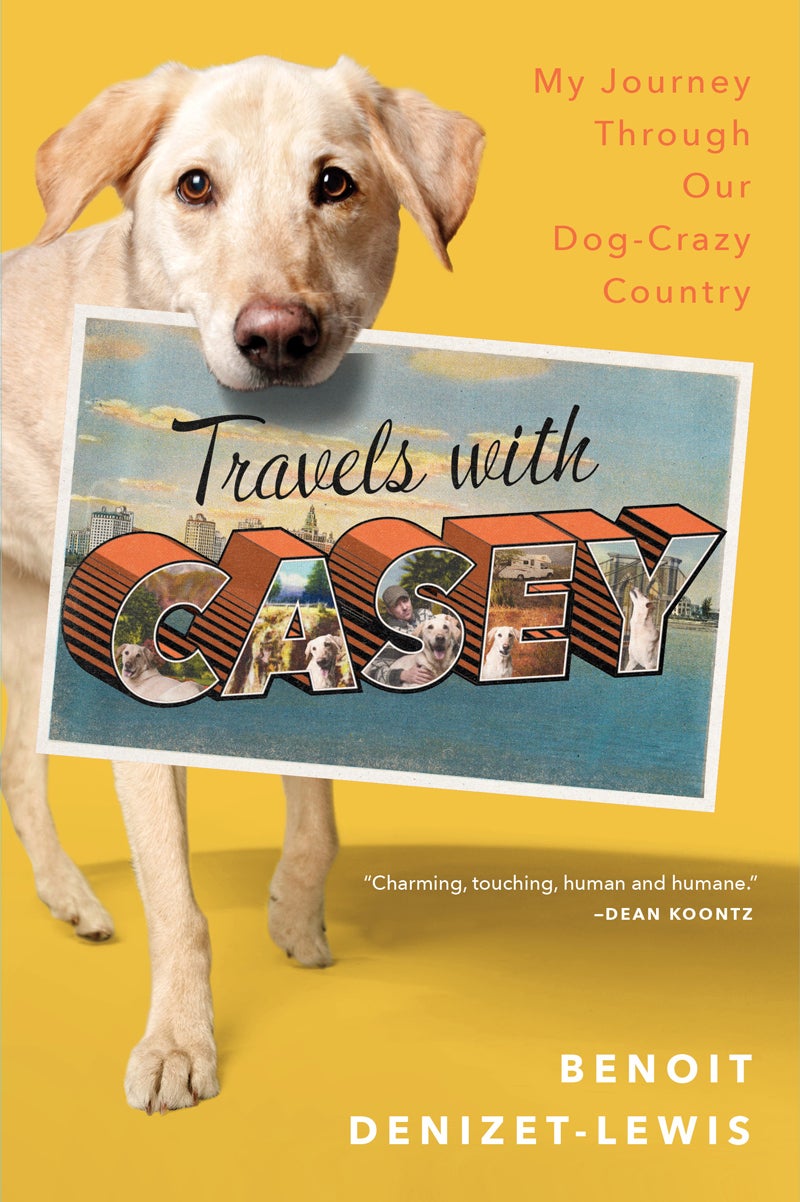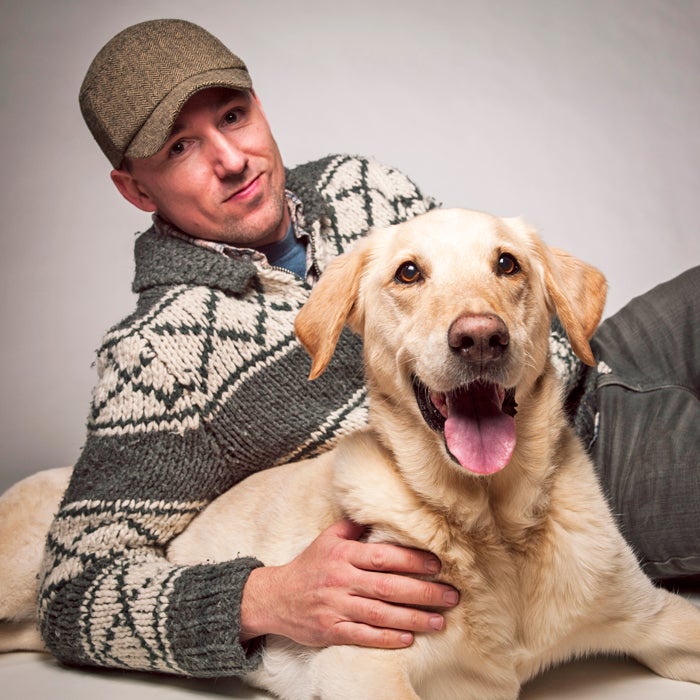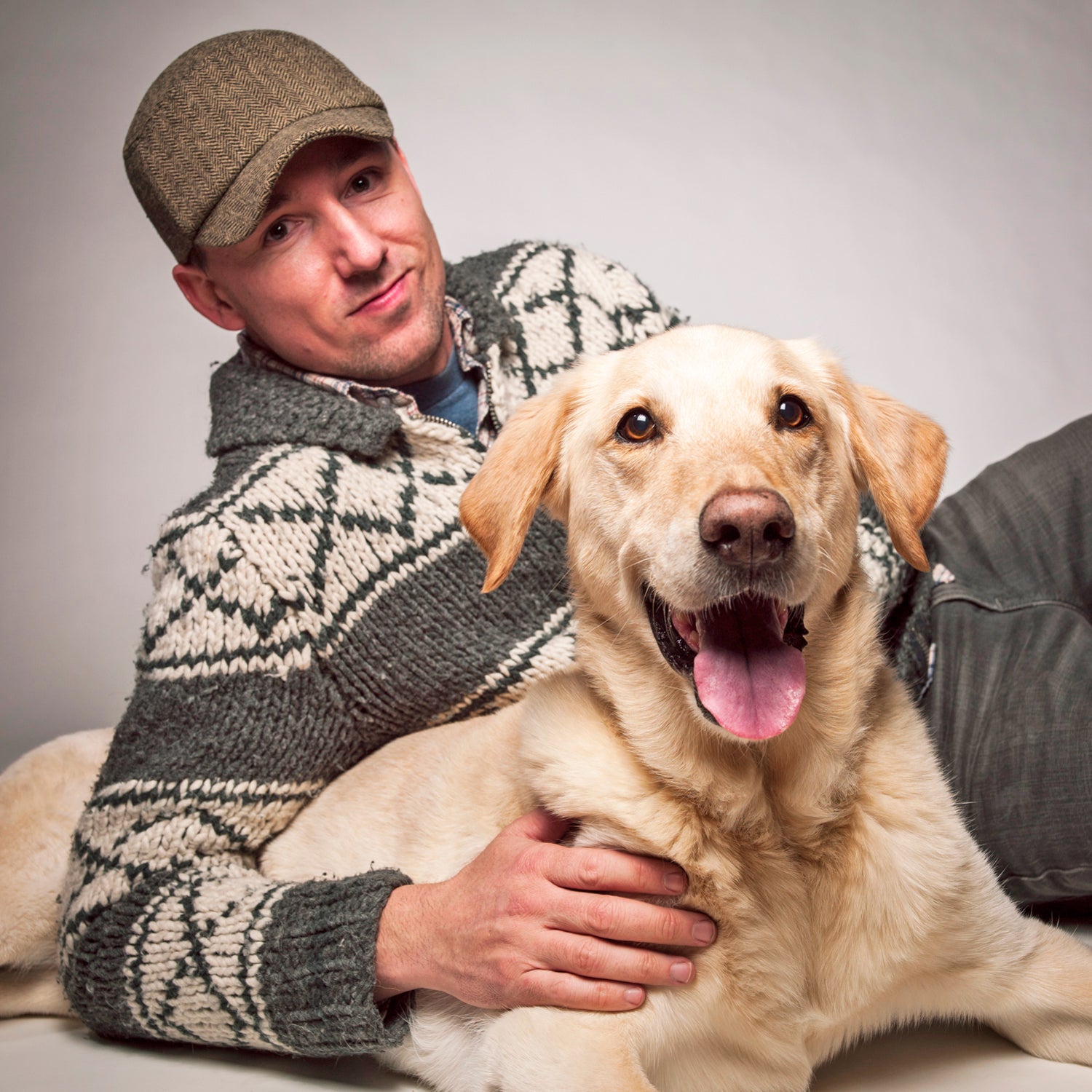Journalist Benoit Denizet-Lewis judges people by whether they love dogs. He has, however, struggled to accept that dogs can love people back. Compelled to understand the canine-human bond, Denizet-Lewis and his yellow Labrador, Casey, jumped in an RV and drove around the country to meet various dogs and their humans. The result? : A funny and insightful survey of the highs and lows of dog life.

���ϳԹ��� caught up with Denizet-Lewis to hear him reflect on the journey, the novel, and the state of his relationship with Casey.
OUTSIDE: What were you most interested in regarding the state of America’s relationship with its dogs?
DENIZET-LEWIS: I have been a dog lover my whole life, and I was interested in the different kinds of relationships that people have with their dogs. For example, the relationship a homeless person in Seattle has with his dog; is that relationship different from that of a rancher in Colorado who relies on his border collies to move cattle? Is that different from a debutante in L.A. who scoots her dog around in a baby stroller?
Also, I was interested in exploring the incredible variety of roles that dogs play in American life. I mean, they help our cops, they fight our wars, they help our sick get better, they help our injured live their lives and get around, they help lonely people living by themselves feel some connection to something.
You’ve always worried that Casey doesn’t really like you. Why’d you think an RV trip might help you deal with that?
I wondered whether I was the right fit for my dog. I worried that I wasn’t giving my dog everything that he deserved or should have for a happy life. I wanted to get on the road and have almost four months devoted entirely to getting to know my dog in a real way.
How did Casey come into your life?
I’m 39 now, and Casey’s 11. When I was 28, I wanted a dog, but I really didn’t know anything about dogs. I was living in the city at the time, and I saw this ad in the paper for puppies for sale at a house in the suburbs. I later realized that Casey was very likely a puppy mill dog; I’d read in the paper that some dogs got sick at the house. Thankfully, Casey turned out to be fine.
You spent time rescuing strays and touring animal shelters. Did that make you take a critical look at what it means to buy versus adopt pets?
Yes. I saw so many stray dogs roaming every corner of this country; I would never buy a dog again. I’m not one of those people who’s going to make people feel guilty if they choose to get a purebred dog. But personally, I urge my friends to go to shelters, to rescue dogs off shelter kill lists, to volunteer at shelters. It was just astonishing to me how many stray dogs there are languishing in shelters.
Where was the problem of stray or unwanted dogs most visible?
I spent a few days in East St. Louis, Missouri, which is the most dangerous neighborhood in America. I spent a few days on this trip rescuing dogs with dog rescuer Randy Grim in a ghetto there. Seeing these dogs injured and roaming in these forgotten, core parts of our country … I saw the same thing on Indian reservations.
For people dealing with extraordinary poverty and hardship, taking care of dogs is not high on the list of priorities. And so you have hundreds of thousands of dogs that just roam, and very few of them live past four or five because they die of preventable illnesses.
What’s something about these dogs’ lives that surprised you?
Randy, the dog rescuer in East St. Louis, talked about how he won’t rescue some dogs because he’s convinced they’re happier living out with their pack than they would be in a home. We have a lot of misconceptions around what dogs need and what dogs want. People might see a homeless person and his or her dog and call Animal Control and say, ‘Oh, that poor dog is living on the street.’ Well, I found that homeless dogs are actually some of the most well-adjusted and happiest around, as long as they can get medical care. They are pretty much always outside, and always with their owner. What better life for a dog?

You adopted a rescue mid-trip. What was that like?
I’ve never felt more alive than when I’m rescuing a dog. I even joked with Randy that I wanted to quit my job as a writer and just rescue dogs with him. There’s such an amazing feeling of helping a dog that’s injured or badly neglected.
The dogs we found included skinny pit bulls that weren’t getting fed. When we found them, they came up to us and were just the sweetest things; they desperately wanted a new chance at life. I also rescued dogs that had been beaten or injured and dogs that had been involved in dog fighting. We saw so many, but you can’t rescue all of them. That’s the hardest part.
How did you and Randy decide which dogs to save?
Randy has to figure out if he has space in the shelter, if he’ll be able to find a foster home, if he has enough vets to deal with these dogs. He ends up having to make these really difficult decisions. You look at these dogs and you say ‘Okay, do I take this one because it’ll only survive a few more weeks if I don’t find him again…’ You almost have to try to read their minds.
I didn’t intend to rescue a dog from an Indian reservation. I just pulled over for gas and a Milky Way. There was this pack of four strays, one of which stayed close to me and really seemed like she belonged there the least. It was difficult to leave the other three behind, but it was a risk even to take the one. She was very timid at first, but she turned out to be just an amazing dog. I named her Rezzy—not very original, I know, but continues the tradition of naming rescue dogs by where you found them. There are a lot of dogs called Freeway.
After learning about all the reasons it’s tough to be an American dog, did you feel that maybe you weren’t screwing up Casey’s life?
Yes, I think that’s true. But I even struggled when I picked up Rezzy. Part of me was like, who am I to just come in here and decide that this dog is unhappy? Does this dog even want to go in an RV with me for the next three months, or is she part of this pack?
I don’t necessarily believe that any dog that’s living outside in a pack is miserable. But I do know the stats on these dogs: they tend not to live long. I found out later when I took Rezzy to the vet that she had a pyometra, which would have been fatal in about two weeks. So it was fortunate.
What made you think Casey didn’t love you?
Casey is really good at looking, well, sort of miserable. He’s really good at sighing. He likes to sigh a lot if he’s not being walked or fed or played with. And he gets more excited sometimes about seeing my friends than he does about seeing me. He’s also not a very physical dog in the sense that, while he likes roughhousing, he’s not the dog that’s gonna cuddle up against you in bed.
For a lot of people, a dog is the one being in life that is happy to be with you, right? I mean, that’s why dogs are so popular— they don’t talk back, and they stick around. That said, it was interesting to see that I certainly wasn’t the only one whose dog brought out insecurities—although I was the only one who worried about not giving my dog the best life possible.
Did you meet anyone whose approach to dogs didn’t make any sense to you?
I was fascinated by several women I met who claimed that the quality of their love for their dog was the same as the quality of their love for human children. I would ask: ‘Well what if your human child died? Would that be the same as if your dog died?’ and they insisted that, yes, it would be. As much as I love my dog, I know that I would mourn a family member or human friend differently than I would a dog.
What about people who don’t, or can’t, have that close relationship with their dog?
I was interested in people who have dogs that are supposed to work—on farms, as sled dogs. These are dogs that cannot be spoiled as much. A lot of humans really struggle with keeping that boundary.
In theory a working dog is happiest when it has a very clear job. These dogs know they’re not house dogs and don’t need constant human connection or attention, but people still struggle with that. They’re like, ‘Yeah, I sneak ’em food when I’m not supposed to,’ or ‘I let ’em sleep in the bed sometimes.’
We love dogs at ���ϳԹ���, especially when we’re exercising with them. Can you tell us about about your and Casey’s collective fitness exploits along the way?
We were constantly in nature, hiking along the Appalachian Trail and in Colorado. We also went dock jumping. Casey was not a natural at that at all. I had to cannonball into the water hoping that I would show him that it was safe, but he was scared by the drop into the pool. I also did yoga on the beach with my dog—something called Doga.
How healthy is our relationship with dogs in this country?
On one hand, we spoil our dogs and treat them like family members. On the other hand, hundreds of thousands of dogs are returned to shelters every day, dumped, given up on, mistreated, neglected. So I wanted the book to be realistic about that and not just be a story about how wonderful our dogs are, and how great their lives are, because that’s not true for every dog.
If I meet someone and they love dogs, I tend to give them the benefit of the doubt and just assume from the beginning that they’re a kind, nice, generous person. And then, you know, people can still prove you wrong. There are some people who love dogs that aren’t pleasant to other humans.
How did your relationship with Casey change because of the road trip?
Let’s put it this way: I’m aware now that it’s not Casey’s job to care for my emotional needs. As I start to sense myself projecting onto him, or being sad that he’s not a certain way, I catch myself and I rarely feel bad about it anymore.
So now, in the time we have left—he’s 11 and starting to slow down—my goal is just to appreciate him for the funny, goofy, friendly dog that he is and not put any more expectations on him. Some days he wants to cuddle, other days he doesn’t, and you know, that’s fine.


